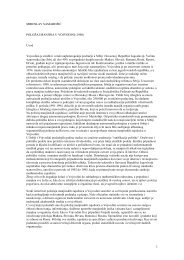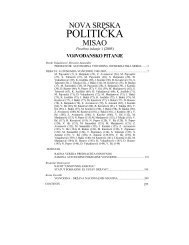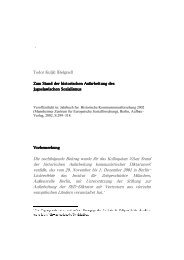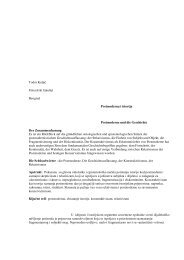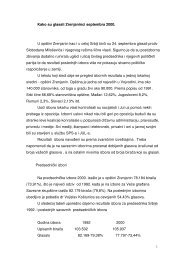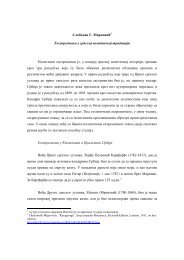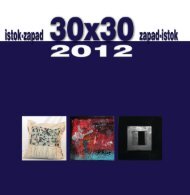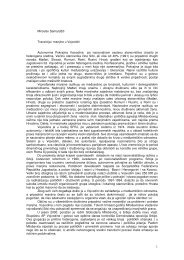Todor Kuljić TITO -sociološkoistorijska studija- (Drugo ... - Početak
Todor Kuljić TITO -sociološkoistorijska studija- (Drugo ... - Početak
Todor Kuljić TITO -sociološkoistorijska studija- (Drugo ... - Početak
Create successful ePaper yourself
Turn your PDF publications into a flip-book with our unique Google optimized e-Paper software.
the collapse of Yugoslav socialism memories of Tito were “unfrozen” and became the subject<br />
of historical cvontroversies. While anticommunist historians demonised Tito, he is in the<br />
people’s memory hero and positive person. The mobilisation of an antititoism has reshaped the<br />
Serbian right.<br />
Chapter 11. treats Tito’s self-understanding and personal traits which effected his rule, an the<br />
last 12. Chapter gives a judgement on the function of Titos rule and the role of his personal<br />
achievements.<br />
The historical and theorethical framework of this book is the permanently facing, comparation<br />
and elevation of the two opposite sides of Tito’s rule. In other words the historical judgment of<br />
Tito’s role premises a differentiation between its progressive and conservative components.<br />
History will, probably, give more weight to Tito’s charisma as a means of integrating a<br />
complex state, than as an expression of his personal ambitions without thereby denying that the<br />
growing charisma indiced return effects and encouraged immoderate political ambitions.<br />
History will register the deeper enlightening and state-integrative goals of the party<br />
management more than the small group career interests that were protected by the leader’s cult.<br />
Personal glorification and the instrumental use of the ruler’s cult are a historically more<br />
ephemeral and less important aspect in comparison to the objective role of the charisma. Tito’s<br />
charisma was an important base for state centralization and, during his first stage, for<br />
accelerated technological and economic modernization of the country as well. The super-ethnic<br />
elevation of the leader’s cult encouraged cosmopolitization, deprovincialization and<br />
pacification of the chaotic Balkan spaces. That is the central historical function of Tito’s rule,<br />
but it cannot be separated from its ideological basis. As one version of a super-ethnic<br />
cosmopolitian ideology, marxism certainly played an important role in bringing closer<br />
traditionally related, but also conflicted, ethnic groups. As a means od self-protection of several<br />
small ethnic groups from cultural and linguistic discrimination, isolation and provincialism,<br />
Yugoslavianism (contra today’s nationalisms) found in marxism a strong instrument of<br />
modernization. Internationalistic ideology and the cult of super ethnic class leader were<br />
inseparable components of the uneven and contradictory process of Balkan<br />
cosmopolitanization.<br />
In this process the rolle of Tito’s personality were activ. As a wise, penetrating and flexible<br />
politician, by skilfully using his own authority in foreign and domestic politics, Tito as a ruler<br />
managed to keep the Yugoslav ethic groups together in a common state for the longest period of<br />
time, and gave Yugoslavianism its most lasting state form. In the history of the Left, he will be<br />
remebered as a ruler who, in the framework of his times, tried to democratize one-party<br />
socialism. This attempt was inspired far more by the direct democratic plebeian tradition of<br />
socialism than by a search for an institutionally and legally regulated division of power. In a<br />
relatively conflict-less way and with the help of a monopolistic party, Tito developed a specific<br />
regime of personal power and then became its captive, convicted that his life-long rule was the<br />
irreplaceable core of integration. Despite the civil war in Yugoslavia in the 1990-th and the<br />
downfall of multhiethnic Yugoslavia, it seem that, like in many similar historical examples,<br />
immeasurable personal power will remain in the shadow of demonstrated modernizational<br />
historical achievement.<br />
Memory of Tito is a kind of “symbolic power” in the politics as strategic public claim-making<br />
and struggle over public meanings in specific cultural contexts. While present politicians have<br />
power over memory, memory also has power over them. The uses and abuses of memory of<br />
Tito shows a connection between memory and interests. Our past has so often been<br />
instrumentalised to legitimate the national state and its glory. Cold memory of Tito (without<br />
emotionalism and moralisation), presented in this book, could actually serve as a subversive<br />
counter concept to a new monumental historical founding myths.<br />
228



